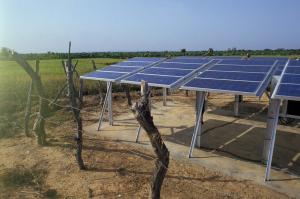You are here
- Home
- Can Chinese investment make Africa's energy go green?
Can Chinese investment make Africa's energy go green?
8 December 2021

Renewables such as wind and solar supported by Chinese investment and know-how could enable sub-Saharan Africa to achieve its goal of universal access. This is according to a new report jointly prepared by The Open University, The Institute for Development Studies and The African Climate Foundation.
But there are considerable challenges to be overcome on both the Chinese and African sides, says the report Scaling China's Green Energy Investment in Sub-Saharan Africa: Challenges and Prospects.
It provides context to the Sino-African Declaration on Climate Change, issued by jointly by Africa and China at the 2021 Forum on China-Africa Co-operation(FOCAC) in Dakar, Senegal, in November, where the Chinese President also announced a Green Development Programme.
More than 600 million people in sub-Saharan Africa had no access to electricity in 2018, estimates say, and this is projected to rise to two billion as the population grows.
China has faced similar challenges of energy access in the past, and has overcome them, thanks to massive investment. She is also a leader in renewable energy technology manufacture, finance and supply, particularly in the areas of onshore wind and solar PV.
Despite all this, only a small segment of China’s $37bn investment in energy projects in Africa is spent on developing wind and solar energy.
The report draws on detailed Open University-led research funded by the Natural Resources Defense Council into greening the Chinese belt-and-road initiative in Africa, to analyse the causes of this situation and propose strategies to tackle it.
Dr Frangton Chiyemura, based in the Department of Development Policy and Practice at The Open University, is one of the report’s authors. He said key issues identified in the report include:
- Chinese policy community and institutional arrangements for overseas energy activities are not necessarily suitable for scaling up renewable energy activities, owing to incoherent policy goals, an inflexible project screening process and a lack of 'business' engagement.
- There is a lack of a green agenda among the key actors from both China and Africa, which is deeply rooted in scepticism about renewable energy as compared to conventional energy sectors and their project development model.
- Both African and Chinese state-owned enterprises in traditional energy sectors have tremendous influence in pushing or deterring the renewable energy agenda.
- Chinese involvement in African countries’ renewable energy sector has much to do with the concerns about the host country’s macroeconomic performance and political climate, which can deter investment, particularly when a sovereign guarantee is absent.
Recommendations for change
The report makes detailed recommendations for change to address these issues. Its key messages are:
China needs to make changes to its regulatory, financial and business model and framework, and to foster new initiatives to promote innovative solutions outside the current model, which favours large-scale and conventional projects.
African governments should exhibit strong determination and ambition for a clean energy transition, which would provide a signal for Chinese companies and financial institutions to consider alternative energy development pathways.
For more details, download Scaling China's Green Energy Investment in Sub-Saharan Africa: Challenges and Prospects here.
Watch the launch-related webinar and discussion here.
Image: Solar panels on a farm in Mali. © Curt Carnemark / World Bank CC BY-NC-ND 2.0
Share this page:
Monthly Archive
- March 2024 (1)
- November 2023 (1)
- February 2023 (1)
- January 2023 (1)
- November 2022 (1)
- October 2022 (1)
Contact us
To find out more about our work, or to discuss a potential project, please contact:
International Development Research Office
Faculty of Arts and Social Sciences
The Open University
Walton Hall
Milton Keynes
MK7 6AA
United Kingdom
T: +44 (0)1908 858502
E: international-development-research@open.ac.uk
.jpg)